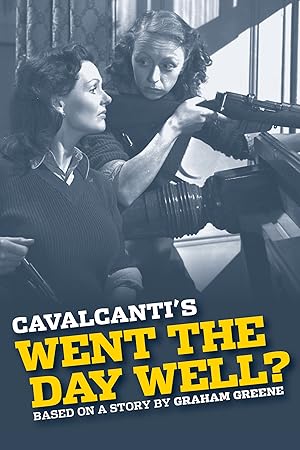
Went the Day Well? Page #4
Disgraceful!
Well, here we are, sir.
Yes, you can see the whole place from here,
except the manor house,
that's just beyond those trees.
Nice and compact,
easy to defend from up here.
- Have you worked out a plan of defence?
- Oh, yes, sir.
To begin with, I've established
an observation post over there.
- Just behind that hedge, there.
- Good.
- Then I've light machine-gun posts.
- How many'? Whereabouts?
at the bend there.
And the second one
at the top of the school lane.
- The one that runs south from the green.
- Oh, yes.
And the third down the road
past the village hall.
Just near the manor house gates.
If you were the enemy, which direction
would you deliver your main attack from?
The woods around the manor house, sir.
- They give much the best cover.
- Yes.
Well, I think you've told
me all I want to know.
You can always give Drew a ring,
if there's anything else.
- That's right.
- Thanks.
I appreciate your cooperation, Mr Drew.
It's going to make my
job a good deal easier.
If there's nothing more
for the moment, sir,
I think I ought to be getting along
with my deliveries.
Yes, and if any of your customers are
angry, please put the blame on me.
- Good day, sir.
- Good day.
I'll see you tomorrow at the exercise.
- Splendid fellow.
- Oh, yes, keen as mustard.
What is this exercise, anything special?
No, action in the event
of a parachute landing.
in case I need you.
All right, I'll have a sprained wrist
or something.
If you've any general suggestions to make,
I'd like to hear them.
Well, most of your men could pass
for 100% British
- like the sergeant, couldn't they?
- All, except one. A radio technician.
Well, I suggest that some of them
should pay a visit to the local pub,
The Ring of Bells, tonight.
Look very odd if they didn't.
Right! Anything else?
Well, they should make themselves
useful in their billets.
So?
You know, minding the baby and keeping
an eye on the kettle, and so on.
Ah, I see.
What part of the world do you come from?
Manchester.
Eee, then we're neighbours.
I come from Stockport.
Good old Piccadilly of a Saturday night.
I said I come from Manchester, not London.
Well, I know you did,
but I mean Piccadilly in Manchester, silly.
Oh, of course, I was forgetting.
I left Manchester when I was a child.
Oh, I see.
Well, that's done anyhow.
I'll take these. Come on.
There we are. Put those on the dresser.
Now come and sit down
and make yourself comfy.
Seven days' leave isn't much, is it?
No, it's all we chaps get.
I know.
But have I been waiting for it.
Translation
Translate and read this script in other languages:
Select another language:
- - Select -
- 简体中文 (Chinese - Simplified)
- 繁體中文 (Chinese - Traditional)
- Español (Spanish)
- Esperanto (Esperanto)
- 日本語 (Japanese)
- Português (Portuguese)
- Deutsch (German)
- العربية (Arabic)
- Français (French)
- Русский (Russian)
- ಕನ್ನಡ (Kannada)
- 한국어 (Korean)
- עברית (Hebrew)
- Gaeilge (Irish)
- Українська (Ukrainian)
- اردو (Urdu)
- Magyar (Hungarian)
- मानक हिन्दी (Hindi)
- Indonesia (Indonesian)
- Italiano (Italian)
- தமிழ் (Tamil)
- Türkçe (Turkish)
- తెలుగు (Telugu)
- ภาษาไทย (Thai)
- Tiếng Việt (Vietnamese)
- Čeština (Czech)
- Polski (Polish)
- Bahasa Indonesia (Indonesian)
- Românește (Romanian)
- Nederlands (Dutch)
- Ελληνικά (Greek)
- Latinum (Latin)
- Svenska (Swedish)
- Dansk (Danish)
- Suomi (Finnish)
- فارسی (Persian)
- ייִדיש (Yiddish)
- հայերեն (Armenian)
- Norsk (Norwegian)
- English (English)
Citation
Use the citation below to add this screenplay to your bibliography:
Style:MLAChicagoAPA
"Went the Day Well?" Scripts.com. STANDS4 LLC, 2024. Web. 12 May 2024. <https://www.scripts.com/script/went_the_day_well_23229>.


Discuss this script with the community:
Report Comment
We're doing our best to make sure our content is useful, accurate and safe.
If by any chance you spot an inappropriate comment while navigating through our website please use this form to let us know, and we'll take care of it shortly.
Attachment
You need to be logged in to favorite.
Log In